Poultry farming is a thriving industry in Thailand, with a rich history and diverse poultry breeds. Starting a poultry farm in Thailand comes with numerous benefits. The poultry products demand like eggs, and chicken meat is consistently high due to the country’s growing population and increasing consumer preferences. Additionally, the tropical climate of Thailand provides favorable conditions for raising chickens throughout the year.
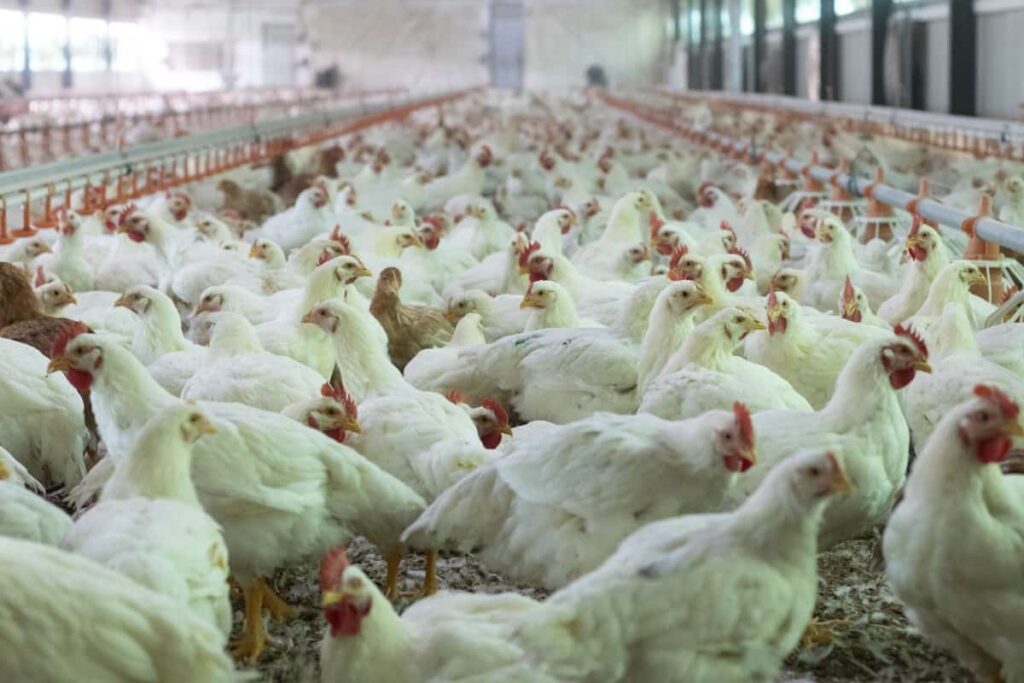
Thailand has a thriving domestic and international market for poultry products, providing ample opportunities for profitability. The country’s strategic location in Southeast Asia allows easy access to neighboring countries, further expanding market potential. Additionally, the tropical climate of Thailand is well-suited for poultry farming as it provides favorable conditions for bird growth and productivity.
The abundance of natural resources such as water and land also contributes to the ease of setting up and managing poultry farms. The Thai broiler industry has utilized new technologies, including improved genetics, farm management, and feed nutrition. Furthermore, Thai poultry farmers benefit from government support and initiatives to promote sustainable practices within the industry. This includes assistance with technology adoption, disease control measures, and infrastructure development.
Types of Poultry Farmed in Thailand
Poultry farming in Thailand is known for its diverse range of chicken breeds. Among them, four Thai indigenous chickens have gained significant attention – Pradhuhangdum (PD), Luenghangkhao (LK), Dang (DA), and Chee (CH). These indigenous chickens are unique to Thailand and are crucial in conservation breeding and sustainable utilization. Pradhuhangdum, known as the Black Silkie chicken, stands out with its fur-like black feathers.
This breed is cherished for its meat quality and is often used in traditional dishes due to its tender texture. Luenghangkhao, or the White-legged Bantam chicken, features striking white feathers and distinct red combs. It is considered an excellent dual-purpose bird, providing both meat and eggs. Dang chickens are famous for their attractive plumage colors that range from golden brown to reddish-brown shades.
They are primarily bred for their flavorful meat. Chee chickens showcase stunning multicolored feathers, making them visually appealing. They are versatile birds suitable for both egg production and meat consumption. In addition to these indigenous breeds, Thailand also farms popular commercial poultry breeds such as Cobb 500, Ross 308, Hubbard JA757, and Arbor Acres. These breeds have been carefully selected for their high meat or egg production capabilities, making them sought after by both local consumers and international markets.
Advantages of Poultry Farming in Thailand
The main advantage of starting a poultry farm in Thailand is the country’s high demand for poultry products. Thailand has a large population; chicken meat and eggs are staple food items for many households. This means that there is a constant market for poultry products, ensuring steady sales and potential profit. Additionally, Thailand enjoys favorable weather conditions for poultry farming.
In case you missed it: Fish Farming in Thailand: Requirements, Types of Fish, and Government Support
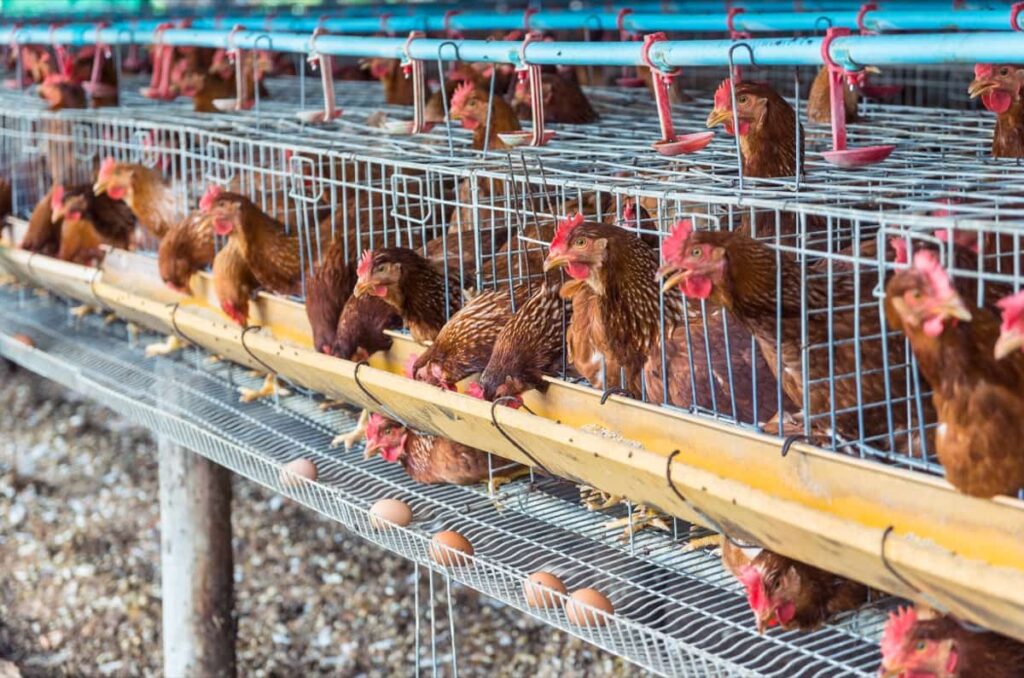
The tropical climate provides ideal temperatures and humidity levels, which are essential for the growth and health of chickens. Another benefit of starting a poultry farm in Thailand is the availability of indigenous chicken breeds unique to the country. These breeds are known for their resilience, adaptability, and disease resistance, making them well-suited to local farming conditions. Furthermore, these indigenous breeds can be promoted as genetic resources for conservation breeding programs.
Steps to Starting a Poultry Farm in Thailand
- Research and Planning: Begin by conducting thorough research on the poultry industry in Thailand, including market demand, competition, and government regulations. Develop a business plan that outlines your goals, budget, marketing strategies, and target audience.
- Secure Land and Facilities: Find suitable land with access to clean water sources and electricity. Construct or renovate chicken houses that provide adequate space for the birds to roam around comfortably.
- Choose the Right Poultry Breeds: Select poultry breeds that are well-suited for the Thai climate and have high productivity rates. Consider factors such as egg-laying capacity, meat quality, disease resistance, and adaptability.
- Procure Equipment and Supplies: Purchase necessary equipment, such as feeders, drinkers, incubators, brooders, ventilation systems, etc., from reliable suppliers to ensure the smooth functioning of your farm operations.
- Obtain Licenses and Permits: Apply for all required licenses from relevant authorities before commencing operations. This includes permits for constructing or renovating chicken houses and licenses related to animal welfare standards.
- Establish Feed Supply Chains– Establish connections with reputable feed suppliers who can provide nutritious feed at competitive prices regularly.
- Maintain Biosecurity Measures – Implement strict measures to prevent disease transmission within your flock.
Tips for Managing a Successful Poultry Farm
Proper Housing: Ensure your poultry farm has well-ventilated, clean housing facilities that provide adequate bird space. Regularly clean and disinfect the premises to prevent disease outbreaks.
High-Quality Feed: Provide your chickens with a balanced diet of high-quality feed. Consult with nutritionists or experts to formulate appropriate diets that meet their nutritional requirements at different stages of growth.
Hygiene and Biosecurity Measures: Implement strict biosecurity measures, such as controlling access points, regular health checks, and proper waste disposal practices, to prevent the spread of diseases within your flock.
Disease Prevention: Vaccinate your chickens regularly according to recommended schedules to protect them from common diseases prevalent in your area.
Monitoring Production Performance: Regularly monitor key performance indicators like feed conversion ratio (FCR), mortality rate (%), weight gain per bird (grams/day), egg production rate (%), etc., to identify areas for improvement or early signs of problems within the flock.
In case you missed it: Pig Farming in Thailand: Breeds, License, and Permissions to Start
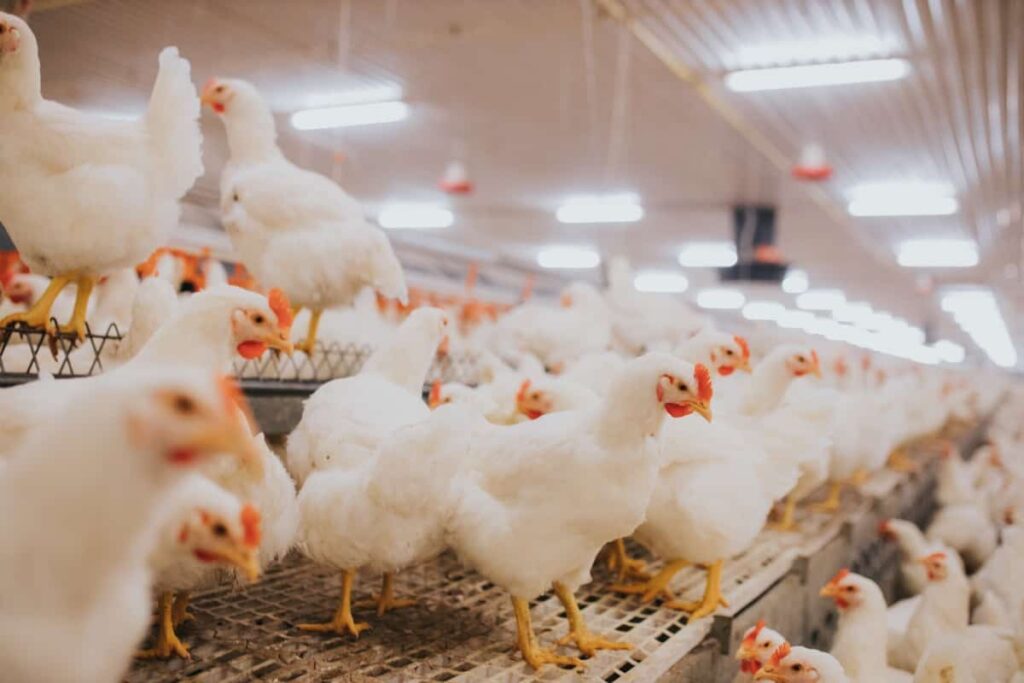
Sustainable Practices in Thai Poultry Farming
Thai poultry farmers have embraced sustainable practices to ensure the long-term viability of their farms while minimizing negative environmental impacts. One such practice is using organic feed, which reduces reliance on chemical fertilizers and pesticides. Farmers can provide healthier diets for their birds by choosing organic feed options and reducing the risk of harmful residues in poultry products.
Additionally, many Thai poultry farms have implemented efficient waste management systems. This includes proper disposal of manure and wastewater through composting or recycling methods. These practices help maintain a clean and hygienic farm environment and contribute to reducing water pollution.
Another sustainable practice commonly seen in Thai poultry farming is responsible land management. Farmers prioritize soil conservation techniques such as crop rotation and cover cropping to maintain soil fertility without depleting its resources over time. Sustainable practices play a crucial role in ensuring the future success of the Thai poultry farming industry.
License and Permissions Required for Poultry Farming in Thailand
The first step is obtaining a land-use permit from the local government authority, which verifies that the chosen location is suitable for poultry farming. Next, aspiring farmers must apply for a livestock registration certificate from the Department of Livestock Development. This certificate ensures compliance with animal health regulations and confirms that your farm meets biosecurity standards.
Additionally, obtaining an environmental impact assessment (EIA) may be necessary, depending on the scale of your operation. This assessment evaluates potential environmental impacts such as waste management and pollution prevention measures. Furthermore, securing all necessary water usage and waste disposal permits is essential. Ensuring compliance with these regulations protects the environment and guarantees sustainable operations.
Government Support for the Poultry Farming Industry
The poultry farming industry in Thailand has been receiving significant support from the government. Recognizing its importance as a key food security and economic growth sector, the Thai government has implemented various measures to promote and protect poultry farming. One of the ways that the government supports this industry is through providing financial assistance and subsidies to poultry farmers.
These funds can be used for purchasing equipment, improving infrastructure, or investing in new technologies. Grants are also available to encourage research and development in disease prevention and feed production. In addition to financial support, the government has established regulatory frameworks and standards to ensure that poultry farms operate according to best practices. This includes guidelines on biosecurity measures, animal welfare, and environmental sustainability.
In case you missed it: How to Start Dragon Fruit Farming/Pitaya in Thailand: A Step-by-Step Guide for Beginners
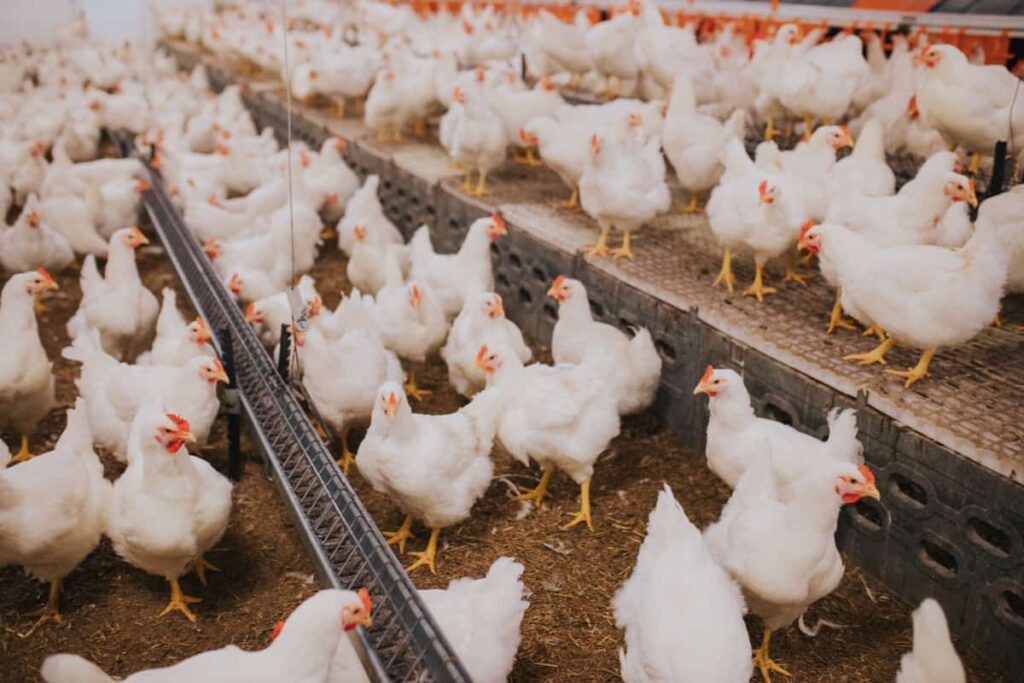
Furthermore, the government actively promotes international trade agreements that benefit the poultry farming industry by opening export markets for Thai chicken products. This helps create more opportunities for local farmers to expand their businesses and increase profitability. These supportive initiatives demonstrate the commitment of the Thai government to fostering a thriving poultry farming industry.
Poultry Farming Techniques Used in Thailand
One such technique is an Evaporative Cooling System (EVAP), which maintains temperature and humidity levels day and night. Thailand’s tropical climate can be challenging for poultry farms, as high temperatures and humidity can adversely affect bird health and productivity. The EVAP system addresses this issue by utilizing evaporative cooling principles.
It involves pads or curtains kept wet, allowing air to pass through them. As the air passes through these wet surfaces, it cools down due to evaporation. This technology provides more comfort to broilers by creating a cool and humid environment inside their housing. By controlling temperature and humidity levels, EVAP helps prevent heat stress, improves feed conversion efficiency, reduces mortality rates, and enhances overall bird performance.
The adoption of EVAP systems in Thai poultry farming demonstrates the industry’s commitment to sustainable practices. Farmers can reduce energy consumption by ensuring optimal conditions for broilers without relying solely on artificial means like air conditioning or fans while still providing a comfortable environment for their birds. Furthermore, this technology aligns with Thailand’s efforts towards environmental conservation by minimizing greenhouse gas emissions associated with conventional cooling methods.
Factors Affecting the Cost of Starting a Poultry Farm
Starting a poultry farm in Thailand requires various factors that can influence the cost. One main factor is the size and scale of the farm. The larger the operation, the higher the initial investment needed for land, infrastructure, and equipment. Another factor is the type of poultry raised. Different breeds have varying housing, feeding, and healthcare requirements. Selecting breeds that are well-suited to local conditions can help minimize costs.
Infrastructure costs also play a vital role. Building appropriate housing facilities with proper ventilation, lighting, and temperature control systems can be expensive but essential for maintaining healthy flocks. Feed costs are another significant expense to consider. Sourcing quality feed at an affordable price is crucial for maximizing profits while providing adequate nutrition to the birds.
In case you missed it: Month-Wise Poultry Farm Operations Maintenance and Management For Better Profits
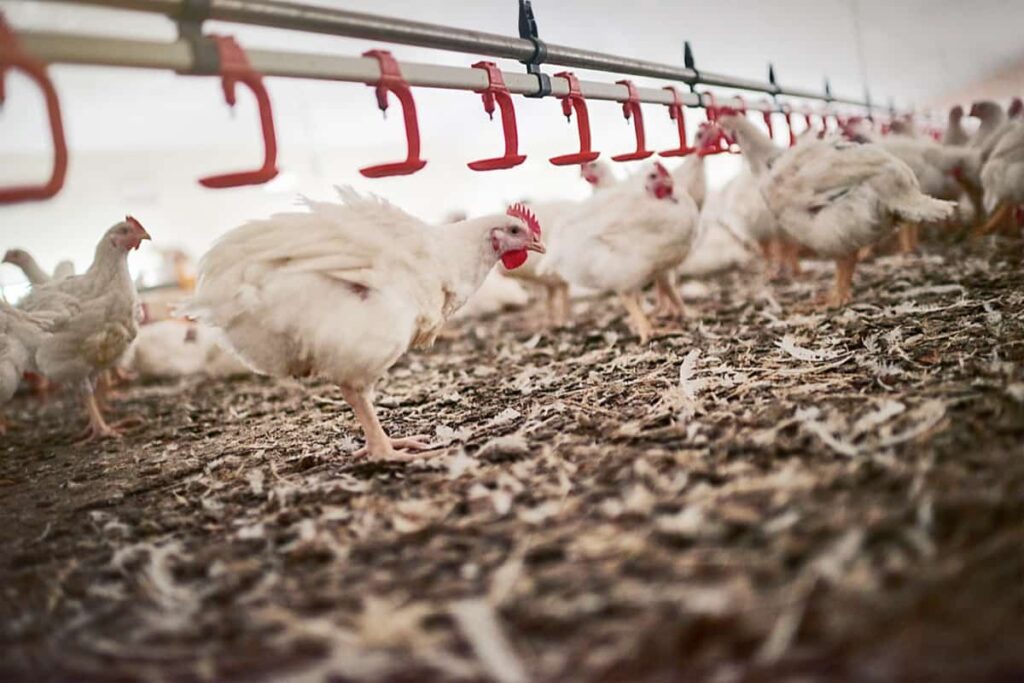
Labor costs should not be overlooked either. Hiring skilled workers who understand poultry farming practices will ensure efficient operations but may come at a higher cost. Additionally, market demand and competition can affect profitability. Conducting thorough market research beforehand enables farmers to decide about production levels and pricing strategies.
Poultry Feed Production in Thailand
The quality and composition of the feed directly impact the health and productivity of the birds. In recent years, there has been significant progress in improving feed production techniques to meet the growing demand for high-quality poultry products. Thailand boasts a well-developed agricultural sector, which provides ample resources for producing nutritious poultry feed.
Local farmers can access raw materials such as corn, soybean meal, fish meal, rice bran, and other grains and protein sources. The use of advanced technology has revolutionized the poultry feed industry in Thailand. Modern equipment ensures precise mixing and grinding processes, resulting in consistent particle sizes and nutrient distribution. This helps optimize digestion efficiency among birds while minimizing wastage.
Furthermore, Thai farmers have embraced sustainable practices by adopting alternative protein sources like insects or algae-based ingredients in their feeds. Such innovative approaches reduce dependence on traditional protein sources and contribute to environmental sustainability by reducing carbon footprint.
Challenges Faced by Poultry Farmers in Thailand
One of the major challenges is disease control and prevention. With large numbers of birds living in close proximity, the risk of diseases spreading quickly is high. Avian influenza outbreaks have been a recurring problem, leading to significant losses for poultry farmers. Another challenge is rising feed costs. The price of poultry feed fluctuates depending on various factors and market demand for raw materials like corn and soybean meal.
This can strain the profitability of poultry farms, as feed usually accounts for a significant portion of their expenses. Maintaining optimal environmental conditions can also be challenging in Thailand’s hot and humid climate. Temperature regulation becomes crucial to prevent heat stress among the birds, which can negatively impact their health and productivity.
Market Opportunities for Thai Poultry Farmers
The country has a strong domestic demand for poultry products, with chicken being the most consumed meat in Thailand. Additionally, Thailand is well-positioned to tap into international markets due to its strategic location and established trade networks. One major market opportunity lies in the export of chicken meat and poultry products. Thailand has gained recognition for its high-quality and affordable poultry products, making it an attractive supplier globally.
In case you missed it: Sustainable Poultry Farming: Benefits and How to Reduce Your Carbon Footprint with Chickens
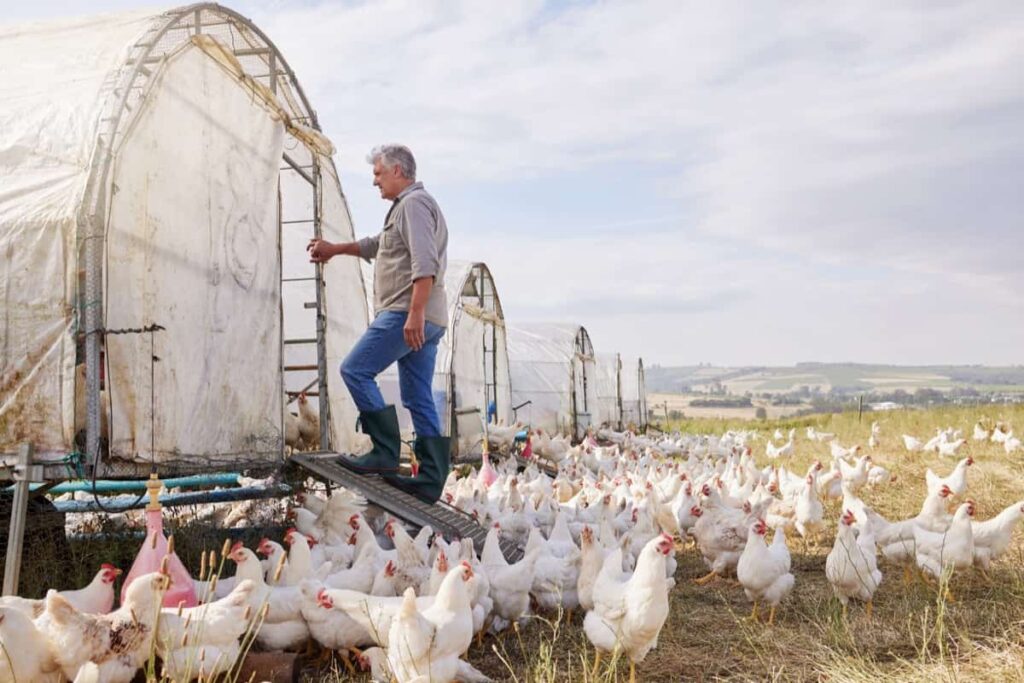
With increasing poultry demand from countries such as China, Japan, and the Middle East, Thai poultry farmers have the potential to capitalize on these lucrative export markets. Furthermore, organic and free-range chicken products have grown popular among health-conscious consumers. Thai poultry farmers can seize this market opportunity by adopting sustainable farming practices and prioritizing animal welfare and environmental sustainability.
Conclusion
Poultry farming is defined as raising domesticated birds, like chickens, ducks, and turkeys, to produce meat or eggs. It is a vital sector in Thailand’s agricultural industry, providing employment opportunities. Poultry farming has a promising future in Thailand due to its thriving agriculture industry and increasing demand for domestic and international poultry products. With proper planning, management skills, and adherence to regulations governing the industry, aspiring entrepreneurs can find success in this lucrative sector.
- Profitable Village Farming Business Ideas in 2024
- High-Yield Aquaculture: Fast-Growing Fish for Farming
- Effective Fish Pond Construction Techniques for Beginners
- Irrigation and Water Management in Pineapple Farming
- Blossom to Harvest: Mastering Flowering and Pollination in Papaya Farming
- Pig Fattening Essentials: From Selection to Sale for Beginners
- Raising Wagyu Cattle: A Complete Guide for Premium Beef Production
- Soil Types and Their Water Holding Capacity
- Optimizing Irrigation Schedules for Coconut Groves for Enhanced Yield
- Espresso Your Garden: Coffee Grounds for Healthier Acid-Loving Plants
- The Best Soil Mix for Snake Plants: How to Mix Your Own Snake Plant Soil
- Green Thumb Success: Expert Tips for Cultivating Greenhouse Beans All Year Round
- Bloom All Year Round: The Ultimate Guide to Indoor Hyacinth Care
- Eco-Friendly Gardening: How to Make Liquid Fertilizer from Kitchen Waste
- Ultimate Guide to Grow Anise in Pots: Explore Seed Propagation to Harvesting
- Guide to Raising Chester White Pigs: Discover Breed Facts to Growth Management
- Mastering the Elegance: The Ultimate Guide to Weeping Cherry Tree Care, Planting, and Maintenance
- Ultimate Guide to Planting Garlic in Grow Bags: Growing Strategies for Beginners
- How to Fix Spider Plant Leaf-Related Problems: Natural and Organic Remedies
- 10 Reasons Why Your Tulsi Plant is Shedding Leaves: Home Remedies and Solutions
- Optimizing Growth and Yield: The Advantages of Palm Bunch Ash Fertilizer
- Utilizing Neem Oil Extract as a Natural Pesticide for Hydrangea
- From Soil to Harvest: Various Ways in Which Farmers Can Use AI Tools
- Steps to Encourage and Induce Citrus Flowers: A Comprehensive Guide
- How to Fix Snake Plant Leaf-Related Issues: Natural and Organic Remedies
- Transform Your Garden into a Fragrant Oasis with Raat Ki Rani (Night Blooming Jasmine)
- Discover the Ideal Chicken Breeds for Philippine Farms
- How to Create a Poultry Egg Farm Business Plan for Profits
- Grow Lemon Cucumbers Like a Pro: Insider Techniques for Bountiful Yields
- Ultimate Guide to Caring for Your Pink Princess Philodendron: Tips for Thriving Variegation
- Areca Nut Profit Per Acre: Calculating Yield and Cost of Cultivation
- How Kaveri Chicken is Becoming a More Profitable Breed in Indian Backyards
- Transform Your Barn: 9 Steps to Convert a Horse Stall into a Chicken Coop
- Exploring Suffolk Sheep Disadvantages with Limitations and Challenges
- Guide to Solving Potted Lemon Tree Problems: How to Revive Lemon Tree in Containers
- Steps to Encourage Female Pumpkin Flowers: Best Strategies for More Flowers and High Yields
